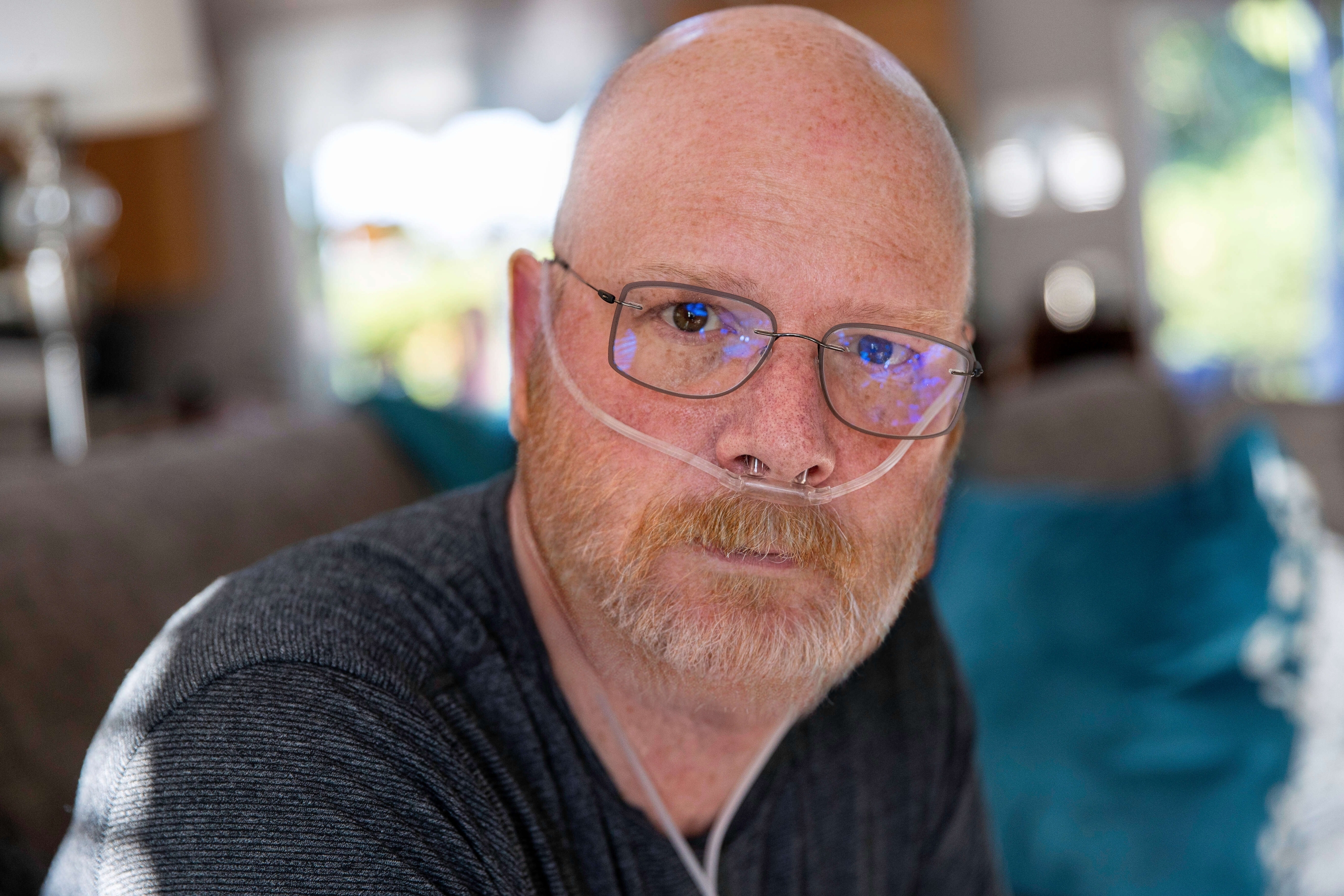What Is Pneumonia?
Many people think of pneumonia as an illness that affects only the frail and elderly, but it can strike anyone, including otherwise healthy young adults and children. Pneumonia is an acute inflammation of the lungs caused by the Streptococcus Pneumoniae bacterium. It leads to air sacs being filled with pus or fluid and is accompanied by symptoms like a high fever, cough, or difficulty breathing. Pneumonia can be life-threatening, especially for vulnerable groups such as the elderly, young children, and those with underlying chronic medical issues. Although pneumonia is more active in the winter when respiratory infections are common, it can occur at any time. Early detection is crucial. If you experience emergency pneumonia symptoms like a high fever or difficulty breathing, visit your local Surepoint ER immediately.
Surepoint is Open 24/7 Near You!
If you are experiencing a high fever or serious pneumonia-like symptoms, please visit the ER nearest you. We are open 24-7, no appointment needed.
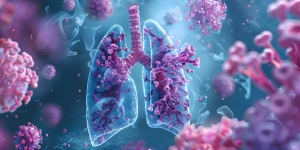 In adults, pneumonia can be caused by different microorganisms such as bacteria (like Streptococcus pneumoniae), viruses (including influenza and respiratory syncytial virus), and fungi (like Pneumocystis jirovecii). Less common triggers involve inhaling foreign substances, exposure to chemicals, and breathing in toxic fumes. Bacterial and viral pneumonia are contagious, spreading through the air when someone inhales the bacteria or virus. Fungal pneumonia, on the other hand, is not contagious. While a child’s immune system usually protects them from pneumonia, if it does occur, it’s often due to a virus. The specific cause varies based on factors like age, overall health, and underlying conditions. Taking preventive measures such as vaccination, good hygiene, and avoiding irritants is crucial. If you suspect pneumonia, seek immediate medical attention for early intervention, as it can significantly impact your recovery. Your health is important to us.
In adults, pneumonia can be caused by different microorganisms such as bacteria (like Streptococcus pneumoniae), viruses (including influenza and respiratory syncytial virus), and fungi (like Pneumocystis jirovecii). Less common triggers involve inhaling foreign substances, exposure to chemicals, and breathing in toxic fumes. Bacterial and viral pneumonia are contagious, spreading through the air when someone inhales the bacteria or virus. Fungal pneumonia, on the other hand, is not contagious. While a child’s immune system usually protects them from pneumonia, if it does occur, it’s often due to a virus. The specific cause varies based on factors like age, overall health, and underlying conditions. Taking preventive measures such as vaccination, good hygiene, and avoiding irritants is crucial. If you suspect pneumonia, seek immediate medical attention for early intervention, as it can significantly impact your recovery. Your health is important to us.
What Are the Signs and Symptoms of Pneumonia?
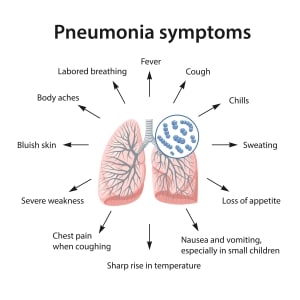
Common pneumonia symptoms in adults can include:
- High Fever (up to 105 F)
- Cough with Bloody, Greenish, or Yellow Mucus
- Chills
- Fatigue
- Loss of Appetite
- Sharp Chest Pain, especially during coughing or deep breaths
- Fever accompanied by sweating
- Bluish Lips and Fingernails
- Confusion, particularly in the elderly
- Rapid Heartbeat and Shortness of Breath
- Nausea, Vomiting, or Diarrhea
Common pneumonia symptoms in children can include:
- Cough and Sore Throat
- Fever and Nasal Congestion
- Diarrhea and Loss of Appetite
- Tiredness or Lack of Energy
- Sweating, Chills, and Flushed Skin
- Wheezing and Difficulty Breathing
- Paleness
- Limpness or Lethargy
- Excessive Crying
- Poor Feeding and Vomiting
- Irritability or Restlessness
When Should I Go To The ER for Pneumonia?
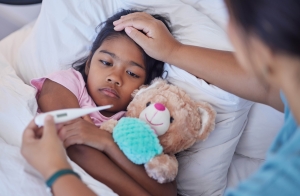 If you think you or your child might have symptoms of pneumonia, don’t wait. Call your doctor right away. Seek immediate medical attention if you have trouble breathing, notice a bluish tint in your lips and fingertips, experience chest pain, a high fever, or a worsening cough with severe mucus. This is especially crucial if you’re in a high-risk group, like adults over 65, children under two, or those with health issues or a weakened immune system. Pneumonia can quickly become serious for vulnerable individuals. When deciding whether to visit the emergency room for pneumonia, consider these factors:
If you think you or your child might have symptoms of pneumonia, don’t wait. Call your doctor right away. Seek immediate medical attention if you have trouble breathing, notice a bluish tint in your lips and fingertips, experience chest pain, a high fever, or a worsening cough with severe mucus. This is especially crucial if you’re in a high-risk group, like adults over 65, children under two, or those with health issues or a weakened immune system. Pneumonia can quickly become serious for vulnerable individuals. When deciding whether to visit the emergency room for pneumonia, consider these factors:
- Your baby or young child is sick
- You are 65 years or older
- Your immune system is weakened
- You have a pre-existing medical condition
- You’re having trouble breathing
- You’re experiencing chest pain
- You’re coughing up blood
If you’re having difficulty breathing or experiencing severe pneumonia-like symptoms, head to the ER right away. Pay attention to your symptoms and seek help without hesitation. Visit the Surepoint emergency room nearest you.
Pneumonia Treatment at Surepoint ER
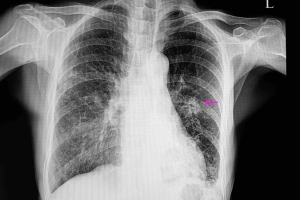 If you’re facing a pneumonia emergency, trust Surepoint ER for the initial care and stabilization needed for a faster recovery. Our comprehensive services include evaluating pneumonia complications, conducting necessary pneumonia diagnoses in our onsite labs, and tailoring treatment based on the type of pneumonia, your overall health, and age. It’s crucial to follow your pneumonia treatment plan diligently until fully recovered. Take prescribed medications, especially antibiotics if the pneumonia is bacterial. Completing the antibiotic course is essential to prevent the infection from returning and resistance development. Typical antibiotics don’t work for viral pneumonia; antiviral medications may be prescribed. In severe cases requiring hospitalization, intravenous fluids, antibiotics, oxygen therapy, and additional breathing treatments may be administered.
If you’re facing a pneumonia emergency, trust Surepoint ER for the initial care and stabilization needed for a faster recovery. Our comprehensive services include evaluating pneumonia complications, conducting necessary pneumonia diagnoses in our onsite labs, and tailoring treatment based on the type of pneumonia, your overall health, and age. It’s crucial to follow your pneumonia treatment plan diligently until fully recovered. Take prescribed medications, especially antibiotics if the pneumonia is bacterial. Completing the antibiotic course is essential to prevent the infection from returning and resistance development. Typical antibiotics don’t work for viral pneumonia; antiviral medications may be prescribed. In severe cases requiring hospitalization, intravenous fluids, antibiotics, oxygen therapy, and additional breathing treatments may be administered.
Our Tips For Preventing Pneumonia
The best way to prevent pneumonia is by getting vaccinated against common bacteria and viruses that can cause it. There are two types of vaccines, Pneumovax23® and Prevnar13®, which protect against pneumonia bacteria. While these shots won’t cover all types of pneumonia, they can make the illness less severe if you do get sick. They are recommended for specific age groups or those at higher risk. Additionally, getting vaccinated against COVID-19 and the flu helps lower your pneumonia risk. Childhood vaccines are essential too, preventing infections that can lead to pneumonia. Alongside vaccination, you can reduce your risk of getting and spreading pneumonia by incorporating these simple everyday steps:
- Quit smoking to protect your lungs and reduce infection risk
- Wash hands with soap before eating, handling food, and after using the restroom; use hand sanitizer if soap isn’t available
- Avoid close contact and sharing items if someone has an infectious disease like flu, cold, or COVID-19
- In healthcare facilities, ask providers about infection prevention measures
- Maintain a healthy lifestyle: eat well, exercise, and get enough rest
- Treat any existing infections or health conditions to support your immune system and lower pneumonia risk
- Limit alcohol intake to a moderate level
(For more information about the types and causes of Pneumonia visit: https://www.cdc.gov/pneumonia)
 Surepoint Emergency Center is a modern emergency medical facility open 24/7/365. As an alternative to the traditional hospital ER experience, we offer convenience and minimal wait time, along with highly-trained emergency medical staff and state-of-the-art equipment.
Surepoint Emergency Center is a modern emergency medical facility open 24/7/365. As an alternative to the traditional hospital ER experience, we offer convenience and minimal wait time, along with highly-trained emergency medical staff and state-of-the-art equipment.
Bringing high-quality emergency care, quickly and easily to your family is our top priority. Committed to making patients feel better faster in a comforting and compassionate environment is what we do.
Fast convenient care in your neighborhood.



